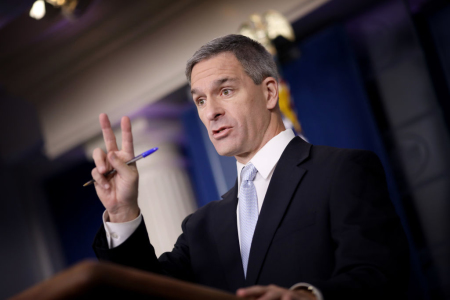DHS proposes new work permit rule for asylum seekers who entered the US illegally

The Department of Homeland Security has released a new rule proposal that would require people who entered the U.S. illegally before seeking asylum to wait at least one year before they can apply for employment authorization.
The rule proposal published Thursday in the Federal Register extends the waiting period to file for the right to work legally in the U.S. from 150 days after the time of their asylum application to 365 days.
Under the current rules, asylum seekers who entered the country illegally can begin working legally in the U.S. after a waiting period of 180 days.
There also are other rule changes in the proposal that some immigration lawyers and immigrant rights groups have voiced concerns about. The proposal is subject to a public comment period that ends on Jan. 13, 2020.
“DHS recognizes that a number of aliens who are legitimate asylum seekers may experience potential economic hardship because of the extended waiting period,” the proposal reads.
“However, the asylum system in the United States is completely overwhelmed. DHS is urgently seeking solutions, including mustering an all-volunteer force to assist with processing incoming migrants at the southwest border of the United States.”
The agency said that the “urgency to maintain the efficacy and the very integrity of the U.S. asylum and immigration system outweighs any hardship that may be imposed by the additional six-month waiting period.”
“The integrity and preservation of the U.S. asylum system takes precedence over potential economic hardship faced by alien arrivals who enjoy no legal status in the United States, whether or not those aliens may later be found to have meritorious claims,” the proposal contends.
Critics of the proposal fear that it will make it more costly for communities to host and support asylum seekers who entered the country illegally.
Immigrants with a credible fear of harm or persecution in their home country can apply for asylum even if they entered the country illegally. If their applications are accepted, they are considered legally present in the country.
The proposal adds that immigrants who, “absent good cause,” enter or attempt to enter the U.S. “at a place and time other than lawfully through a U.S. port of entry” they will be excluded from employment authorization.
Lutheran Immigration Services, one of nine agencies authorized to resettle refugees in the U.S., fears that the new rule will give the DHS the ability to deny employment authorization to asylum seekers who did not enter the country at an authorized port of entry.
The proposal comes after President Donald Trump signed an order in April directing the DHS to craft regulations that would bar immigrants who entered or attempted to enter the U.S. unlawfully from receiving work authorization before their applications are granted.
“These policy changes would be devastating to asylum seekers in this country,” said Krish O’Mara Vignarajah, president of Lutheran Immigration and Refugee Service.
“Without work permits, they will not have the independence to feed their families, to buy medicine for their children, or to provide the most basic necessities for themselves and their loved ones while they await their due process.”
In a statement, Acting Director of Homeland Security Ken Cuccinelli said that the new rules aim to target people who "exploit" the system and delay processing for asylum seekers with legitimate claims.
Cuccinelli, who is known for his conservative stance on illegal immigration, said the goal is for U.S. Citizenship and Immigration Services to prevent “criminal aliens” from receiving work authorization before their case can be adjudicated.
“These proposed reforms are designed to restore integrity to the asylum system and lessen the incentive to file an asylum application for the primary purpose of obtaining work authorization,” he said.
Cuccinelli added that the plan is to address the “pull factors encouraging aliens to illegally enter the United States and exploit our asylum framework.”
Other areas of concern for Lutheran Immigration and Refugee Service include the automatic denial of work authorization for an asylum seeker who has a felony conviction or a conviction of a “serious non-political crime” outside of the United States. The new rules would also bar any applicant convicted of a drug or alcohol offense from work authorization.
The DHS also proposed limiting the validity of work authorization to two years.
The proposal would also eliminate the requirement that the government notifies applicants within 30 days if their application is incomplete.
Lutheran Immigration and Refugee Service also objects to a proposal for mandatory fingerprinting and biometric collections to be paid for by the applicants, something the organization calls an “unprecedented fee for asylum seekers.”
The new rule proposal comes just days after the Trump administration proposed adding a $50 asylum application fee.
The new proposal also drew the ire of Rep. Chellie Pingree, D-Maine, who introduced legislation that would shorten the waiting period to only 30 days.
She told the Press Herald that she believes the new DHS proposal will require asylum seekers to lean more on support programs funded by taxpayers.
Follow Samuel Smith on Twitter: @IamSamSmith
or Facebook: SamuelSmithCP





















